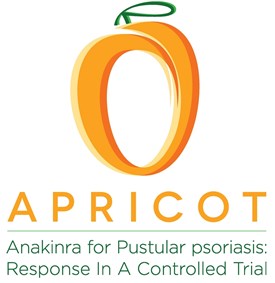19 October 2016
APRICOT - New Palmo-plantar Pustulosis Clinical Trial Recruiting
The APRICOT trial is looking for participants living with palmo-plantar pustulosis (PPP) to help test a potential new treatment.
January 2020 update - Please note that the APRICOT trial has now reached its recruitment target and is no longer actively recruiting new participants.
 Pustular psoriasis is an uncommon but painful and often debilitating form of psoriasis. We are pleased to be involved with a new clinical trial study specifically for palmo-plantar pustulosis (pustular psoriasis of the palms of the hands and soles of the feet, otherwise known as 'PPP').
Pustular psoriasis is an uncommon but painful and often debilitating form of psoriasis. We are pleased to be involved with a new clinical trial study specifically for palmo-plantar pustulosis (pustular psoriasis of the palms of the hands and soles of the feet, otherwise known as 'PPP').
Recent research has shown that PPP may be caused by an abnormal pathway in the body's immune system, involving a protein called interleukin-1 (IL-1). The medication being tested - anakinra - specifically blocks this IL-1 pathway, and this clinical trial sets out to test if it therefore improves PPP.
As well as testing anakinra as a potential new treatment for PPP, this trial also hopes to collect information from participants that will help to explain why and how people get PPP.
APRICOT collaborators, including the Psoriasis Association, are based around the country, have been involved in the project from the beginning, and will also be instrumental in influencing the direction of the trial as part of the trial management group. This clinical trial is led by Professor Catherine Smith at St John's Institute of Dermatology, and has been funded by the Efficacy and Mechanism Evaluation (EME) Programme, a Medical Research Council and National Institute for Health Research partnership.
For more information on APRICOT, please visit the study's website.